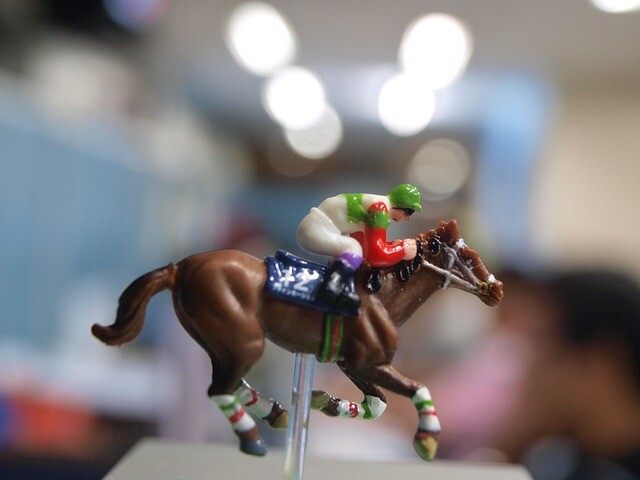 That’s an open-ended question if I ever read one.
That’s an open-ended question if I ever read one.
However, punters often question the merit of trainers. We’ve all done it, hey. ‘I think that horse would be better over a mile! Why is that horse being dropped in distance when it looks like it needs a longer trip?’
Smoke coming out of your ears. Clumps of hair on the floor next to your armchair. You lost a caster last week in a head-bob finish.
Plenty of armchair jockeys inching ever closer to the TV. That imaginary whip raised high above the shoulder, shouting in both hope and horror. It’s pretty much the same for us all (I do include myself here).
Armchair jockey and trainer. I’m proud to wear both hats.
I will call myself Sir Henry Sofa.
Not only would I have trained Frankel I would have ridden him too from my mobility chair. True, in the last furlong I would have raised the recliner a notch or two, but I’d have won in comfy fashion. I’d have cruised over my Axminster carpet like Nijinsky, both ballerina and horse.
I often talk with my brother about horse racing and we have conversations about every aspect including distance, trip, furlongs and yards. With the classic utterance: ‘I don’t think that horse will get the trip!’
How many time have we watched the horse win? It loved every last inch. The trainer, bless their heart, proven correct. The armchair trainer left hoarse. Bewildered. Silenced by reality. But that will never stop Sir Henry Sofa.
He’s the talk of the town.
The next race: ‘I’m sure that jockey booking is a negative!’
Thinking about this whole questioning the trainer idea. To be fair, it’s good to get to the bottom of these things and answer the question once and for all. The reason being, it pays to have a set approach else you lurch from one thought to another which doesn’t help. No one likes someone who lurches. It’s not natural. I makes you sound like a prowler.
Logically, it makes sense to think the trainer not only knows best but they have the best interests for both the horse to win races and the owner(s) who are paying the bill. There may be some trainers who run the horses as if they own them (some do) but most want to win races and if they decide a horse needs a step up or down in distance then there is probably a very good reason for them making that decision.
If we don’t consider the trainer knows best (which is kind of illogical and perhaps cynical) then we are stating the armchair trainer is better informed. By that answer we are stating that trainers are poor judges.
Once again, this really doesn’t make any sense.
It is best to accept that the horse trainer knows best rather than question their knowledge or integrity. Also, if you scratch a horse from your assessment, because you think you know better, then you will often be proved wrong. This has implications if you select another horse in the race because you can guarantee the horse you ditched (‘it’s running over the wrong distance!’) will not even register in your thoughts. The trainer thought the step up in trip would be a positive. Who is likely to know better?
For years I would consider I knew more than the trainer, convince myself I could have ridden a better finish than Lester Piggott (even thought the horse would have been carrying five stone overweight) and if I was an owner/breeder I would definitely have more success than Benny from ABBA.
However, if Benny, the late Sir Henry Cecil and Lester Piggott were looking through the window of a little cottage on the outskirts of Cambridgeshire, they’d witness me shuffling closer to the TV, my armchair rocking back and forth riding out the finish to the next race at Hexham on a cold winter’s day. I’m sure they would be killing themselves laughing as a cup of tea falls into my lap, a slipper is lost under the rug while my betting slip is eaten by the dog.
‘That lads a good judge!’
‘You don’t get carpet burns like that on your knees without knowing a thing or two!’
Laughter erupts from Benny as he shouts: ‘Fan dig, Fen boy.’
I promise never to question another horse trainer or jockey for the rest of my days.
 Established on Cantley Common, Doncaster in 1776, at the suggestion of Lieutenant Colonel Anthony St. Leger, whose name it bears, the St. Leger Stakes is the oldest of the five British Classics. Of course, it is worth remembering that until 1966 the Jockey Club refused to issue training licences to women but, even so, in over half a century since womankind was officially recognised by the governing body, just one member of the ‘fair sex’ has saddled the winner of the St. Leger.
Established on Cantley Common, Doncaster in 1776, at the suggestion of Lieutenant Colonel Anthony St. Leger, whose name it bears, the St. Leger Stakes is the oldest of the five British Classics. Of course, it is worth remembering that until 1966 the Jockey Club refused to issue training licences to women but, even so, in over half a century since womankind was officially recognised by the governing body, just one member of the ‘fair sex’ has saddled the winner of the St. Leger. To readers of a certain age, the late Vincent O’Brien requires little or no introduction. He was, quite simply, one of the greatest, if not the greatest, racehorse trainers of all time. Like his namesake, and successor at the now famous Ballydoyle Stables in Co. Tipperary, Aidan O’Brien, Vincent O’Brien began his training career in the sphere of National Hunt racing.
To readers of a certain age, the late Vincent O’Brien requires little or no introduction. He was, quite simply, one of the greatest, if not the greatest, racehorse trainers of all time. Like his namesake, and successor at the now famous Ballydoyle Stables in Co. Tipperary, Aidan O’Brien, Vincent O’Brien began his training career in the sphere of National Hunt racing. That’s an open-ended question if I ever read one.
That’s an open-ended question if I ever read one. Born in Rugeley, Staffordshire in 1838, John Porter was a hugely successful trainer of the Victorian and Edwardian eras. All told, he saddled 1,063 winners, including 23 Classic winners, and won the Triple Crown on three separate occasions, with Ormonde (1886), Common (1891) and Flying Fox (1899).
Born in Rugeley, Staffordshire in 1838, John Porter was a hugely successful trainer of the Victorian and Edwardian eras. All told, he saddled 1,063 winners, including 23 Classic winners, and won the Triple Crown on three separate occasions, with Ormonde (1886), Common (1891) and Flying Fox (1899).